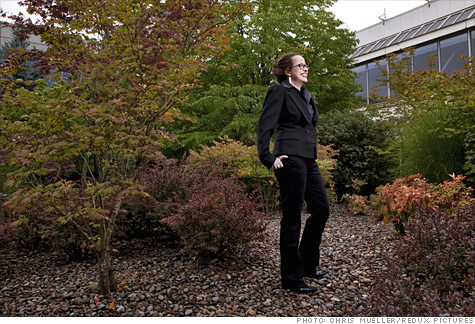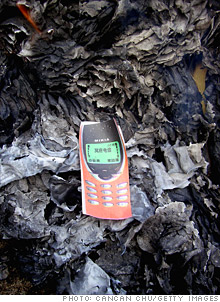
FORTUNE -- About 40 Ph.D. studentsin computer science, potential recruits for chip-giant Intel, have just finished listening to a lecture on the intricacies of circuit design and processor architecture at one of the company's R&D centers just outside Portland, Ore. The conversation is complex, detailed, and very technical.
And then Genevieve Bell saunters in.
 |
| In parts of Asia, families burn photos of phones so dead relatives can talk in the afterlife. |
Dressed head to toe in black, fingers festooned with mammoth rings, she is hoarse from a cold she caught jetting from Australia to Costa Rica to her home base of Portland. She fires up her laptop (black, of course) and warms up the perplexed crowd (what is this wild-haired woman doing here?) with a story about her childhood growing up in an aboriginal community deep within central Australia. "As a very small girl, I was a bit feral. I learned how to kill things," Bell says with an Aussie drawl, her smile broad. The crowd chuckles. "As it turns out, it's a very useful skill to have." Yes, there have been killers before at Intel (INTC, Fortune 500), longtime CEO and chairman Andy Grove chief among them, but none quite like Bell.
Bell's official title at Intel is director of interaction and experience research. Simply put, she's the "right brain" in a sea of scientists and engineers. Her mission: to help the chipmaker power new devices, make new software, and enter new markets by providing its technologists with a better understanding of how people all over the world use computers, phones, and other gadgets.
Other tech companies have social scientists on staff. Microsoft (MSFT, Fortune 500), IBM (IBM, Fortune 500), and Hewlett-Packard (HP) are some of the corporations that have anthropologists and ethnologists working alongside systems engineers and software developers. Xerox (XRX, Fortune 500) may have pioneered the practice when its Xerox Palo Alto Research Center in 1979 hired an anthropology grad student to help engineers build copiers with an easy-to-grasp user interface. Intel is different, though, because it doesn't sell its products directly to consumers. So Bell, 43, has to work a little bit harder to justify her research efforts to her bosses, many of whom grew up in Intel's engineering-driven culture. That's where her killer instinct comes in handy.
Indeed, Bell, who has a doctorate in cultural anthropology, fought hard to get chip designers to rethink their impulse to build ever-faster processors and market them outside the U.S. For great swaths of the world the Internet is, and will continue to be, mostly text on a phone, she says. And so Intel is pursuing that market with its Atom chips, which are cheaper and consume less power than, say, Intel Core i3 or Celeron processors. Bell has also been key in helping Intel move into the smart-TV market, studying how people behave when they are entertained by television in a living room, and how that experience is distinct from sitting in front of a computer.
Bell gathers her insights far from R&D centers like the one in Portland. She recounts meeting a Muslim boy in Kuala Lumpur who used his phone to orient him toward Mecca for prayer. She relates the story of coming across a ceremonial store in a city in Malaysia that had paper facsimiles of the latest cellphones. The paper models were burned so that dead relatives could talk to each other in the afterlife. "Technology is starting to manifest itself in every part of our lives," Bell says. "Not just at work and home but in religious practices, our love lives, and how we keep our secrets."
She spends most of her time in homes and other social centers all over the world, just hanging out with people living their daily lives. Bell has emerged as one of the world's foremost thinkers on the intersection of technology and humanity. "As an anthropologist, I couldn't have picked anything more fertile," she declares. "But let me be clear: I don't believe that technology changes us; we choose to be changed by it. My BlackBerry doesn't wake up in the morning and say, 'What will I do today?'"
"Genevieve and her team cause us engineers to think differently," says Stephen Pawlowski, who heads up research at Intel focused on chip architecture. "We intend to use Bell's expertise heavily as we focus on emerging growth markets."
Intel's ultimate task is to enable technologies that are intimately connected to our lives. It is that "stickiness" that makes Apple products so adored, or explains why BlackBerry devices are addictive. But for all her talk of connectedness and serving the emerging world, Bell remains very much a killer: "If you do it right, if you make the thing in such a way that people love it, it will be part of everything," Bell says. "It sounds macabre, but it has to be so important that you bury people with it." ![]()